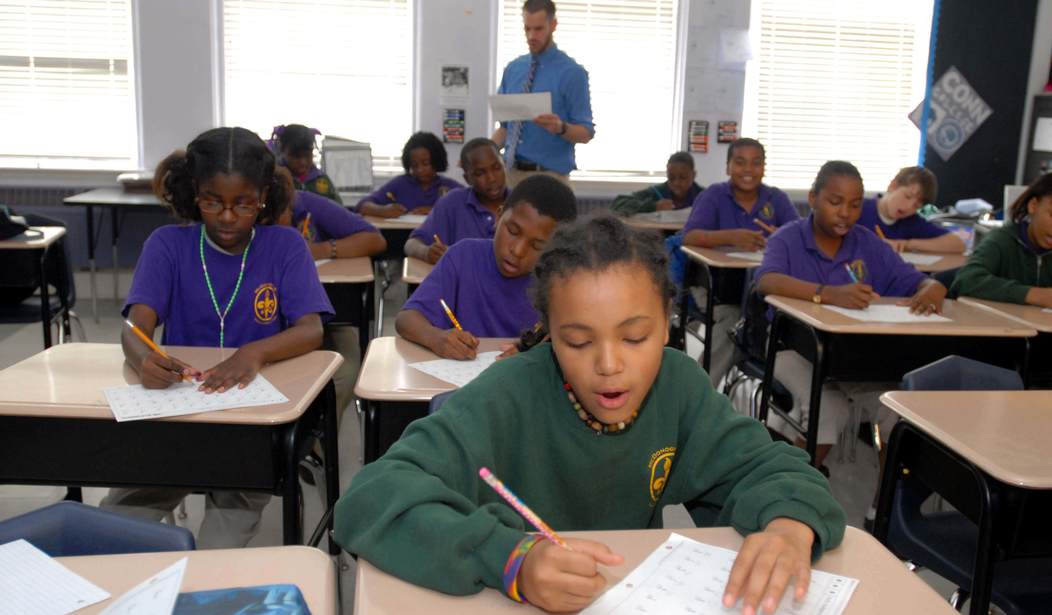A few years ago my friend’s daughter, then a middle-schooler, got up early to make herself eggs on a Monday morning. When her mother asked her why she’d gotten up early to make eggs, a dish she rarely ate, her daughter replied, “We were told to eat a good breakfast today so we could do well on our tests.”
That morning, after eating her eggs, the 7th-grader was cheered on by a cadre of teachers, administrators, and guidance counselors holding up signs that read, “YOU CAN DO IT!” outside each classroom door. When the bell rang, morning announcements were studded with school spirit songs and reminders that all students should do their best on the day’s tests.
When did standardized testing become a sports match worthy of Rocky-esque preparations? When bureaucrats decided to tie funding to test scores. From an economic standpoint, it makes sense. You aren’t going to pay for a service that renders poor results. However, the direct link between government funding and test scores often causes educators to panic over potential lost dollars and lost jobs. Their stress becomes their students’ stress. And suddenly, life for an average 12-year-old involves waking up early to eat eggs lest their entire life be ruined by a growling stomach in the middle of a standardized test.
Recently, author and editor Alexandra Penfold took to Twitter to share the fact that she’d received a remedial writing score on a standardized test in fourth grade, the year she’d decided she wanted to be a writer.
Hashtagging the post #MoreThanATest, she noted that Random House just published her sixth book.
This weekend I sorted through some papers my mom saved from my childhood. The top one is my 4th grade self evaluation. The bottom, my 4th grade state test score. Random House published my 6th book last week. #MoreThanATest pic.twitter.com/kzHFId258x
— Alexandra Penfold (@AgentPenfold) July 16, 2018
The tweet went viral, with teachers and parents sharing it in a show of support for students wracked with the all-too-common phobia of test anxiety.
Writing of his own son’s experience with standardized testing, Timothy Slekar observed:
He sits in social studies and science classes that have been shortened to allow more time for reading and math instruction. He hasn’t been given the opportunity to engage real children’s literature. His reading teacher is clueless about his interests. Five months of drudgery. How much can he take before just the thought of going to school immobilizes him? There is real damage being done. Something has to happen before my son loses all curiosity.
Slekar quotes John Gatto, a retired public school educator who was recognized as Teacher of the Year by both New York City and New York State, who advised parents to peacefully protest standardized testing:
No demonstrations, no mud-slinging, no adversarial politics… [just] peacefully refuse to take standardized tests. … because these tests pervert education, are disgracefully inaccurate, impose brutal stresses without reason, and actively encourage a class system which is poisoning the future of the nation.
Standardized tests, Gatto explains, have been proven ineffective at measuring a student’s long-term success. So, why is so much money – 10 percent of a school’s budget –and time wasted?
Most parents who disapprove of standardized testing, among other aspects of public education, have thus far simply pulled their children out of the system. The number of private and homeschoolers is a drop in the bucket in comparison to the millions of children being forced into standardized testing in public schools. Perhaps with the rise of social media we’ll finally get the kind of mass civil disobedience from within the system that Gatto called for a decade ago. Viral tweets like Alexandra Penfold’s are a good start.









Join the conversation as a VIP Member